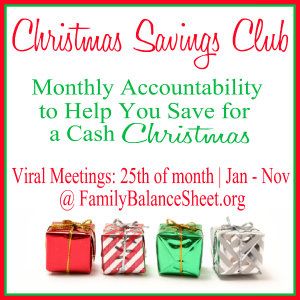Every year, I have a yard sale. It usually coincides with our neighborhood's big sale and I make out quite nicely with the profits. However, this year we were in Pittsburgh and I missed out on the event...and the cash.
So instead, I hauled our stuff to the Salvation Army. I've been tackling clutter since January and I had the boxes stacked in my garage to prove it. While I love the instant cash that you can get from a yard sale, this year a tax deduction will have to do.
It's been awhile since I've taken a tax deduction over having a yard sale, so I did a little research. Unfortunately not everything in your home is considered a tax deduction if donated. The queen sized comforter that I no longer used can be deducted, but the kids' outgrown mega block set cannot.
There are rules to follow when taking a tax deduction for your donated items. According to the IRS Publication 526, "if you give property to a qualified organization, you generally can deduct the fair market value of the property at the time of the contribution."
Clothing and certain household items can be deducted as long as they are in "good used condition or better." Household items that can be deducted if donated are furniture and furnishings, electronics, appliances, linens, and other similar items. Household items NOT included would be food, paintings, antiques, other objects of art, jewelry, gems, and collections.
(There is one exception to that rule: "You can take a deduction for a contribution of an item of clothing or a household item that is not in good used condition or better if you deduct more than $500 for it and include a qualified appraisal of it with your return.")
As described by the IRS, "fair market value is the price at which property would change hands between a willing buyer and a willing seller, neither having to buy or sell, and both having reasonable knowledge of all the relevant facts."
"The fair market value of used clothing and other personal items is usually far less than the price you paid for them. There are no fixed formulas or methods for finding the value of items of clothing. You should claim as the value the price that buyers of used items actually pay in used clothing stores, such as consignment or thrift shops."
Household items. "The fair market value of used household items, such as furniture, appliances, and linens, is usually much lower than the price paid when new. These items may have little or no market value because they are in a worn condition, out of style, or no longer useful. For these reasons, formulas (such as using a percentage of the cost to buy a new replacement item) are not acceptable in determining value. "
"You should support your valuation with photographs, canceled checks, receipts from your purchase of the items, or other evidence. Magazine or newspaper articles and photographs that describe the items and statements by the recipients of the items are also useful. Do not include any of this evidence with your tax return." Keep it with your tax documents.
My experience: The Salvation Army gave me a dated blank receipt for the donated goods. There is space for me to write down all of the items that are deductible. They also include a valuation guide for items donated to the Salvation Army. It is a lengthy, descriptive list of clothing and furniture items with price ranges from low value to high value, depending on the item's condition. For example, a ladies' blouse has a $2 low value up to $7.50 high value. I looked at every item that I was donating and determined what condition it was in. Most of our clothing was in fairly good condition, so I used a middle range. My deduction tally for this haul was $115.
Do you sell your household clutter or take a tax deduction? Let us know about your experience in the comments.
Remember, I am not a tax professional, please refer to the IRS Publication 526 or your tax professional for more information.
Thanks for reading. If you would like to receive FREE updates of FBS, there are four ways to do so:
- have updates sent to your email,
- through your RSS Feed
- become a fan and 'like' FBS on Facebook
- become a Twitter follower



































No comments:
Post a Comment
Thank you for reading Family Balance Sheet and taking the time to leave a comment. I love to hear from readers.